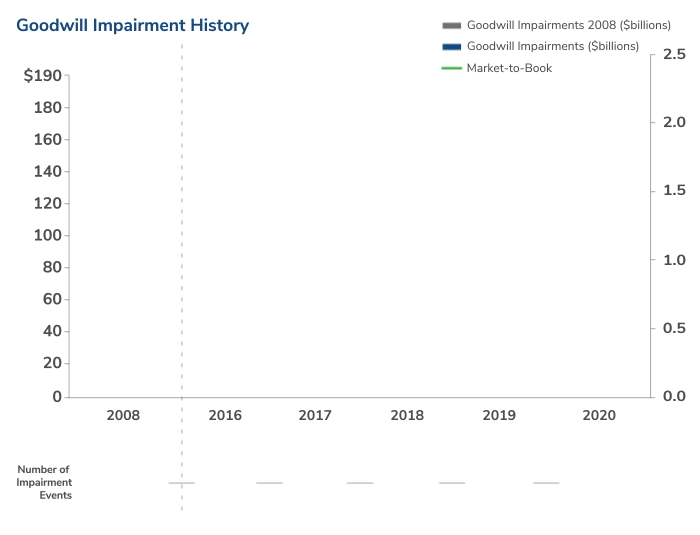The 2021 U.S. Goodwill Impairment Study (the "2021 Study"), now in its 13th year of publication, examines general and industry goodwill impairment (GWI) trends through December 2020 of over 8,900 publicly traded companies incorporated in the U.S.
Our inaugural study was launched in 2009 and focused on capturing GWIs recorded by U.S.-based companies and industries at the onset of the global financial crisis of 2008-2009. We find ourselves again in a period of significant upheaval, with companies forced to navigate the global economic crisis created by the COVID-19 outbreak.
This year’s edition also takes a closer look at the largest 30 impairments recorded during 2020. As an additional feature this year, we provide information on the segment and reporting unit structure of these 30 companies, to the extent that such information was disclosed in financial statements. Finally, this study also aggregates the GWI taken by U.S.-based companies up to the time of writing for calendar year 2021, which demonstrates the extraordinary pace at which many companies and industries recovered from the COVID-19 recession.
Highlights from the 2021 Study include:
- Total goodwill impairments more than doubled between 2019 and 2020—from USD 71.0 billion (bn) to USD 142.5 bn—but this amount still fell short of the USD 188.4 bn level observed in 2008 at the onset of the global financial crisis.
- The swift actions from the Federal Reserve and the U.S. government, which provided unprecedented levels of monetary and fiscal support, fueled a rapid economic recovery, limiting the magnitude of goodwill impairments that otherwise would have been observed, particularly when compared to 2008 levels.
- Although full 2021 calendar year-end results for U.S. public companies are not fully available, information collected from early reporting suggested that overall GWI may be lowest since 2006, demonstrating the extraordinary pace at which many companies and industries recovered from the COVID-19 recession.1

In 2022, investors may be focusing again on goodwill impairments as an important input into their analysis and decision-making. Geopolitical risks stemming from the Russia-Ukraine war are dampening global economic prospects, while inflationary pressures are leading the Federal Reserve and other major central banks to raise interest rates. A consequent increase in cost of capital and the deterioration in the global economic outlook may lead to another cycle of impairments.
The smooth functioning of global capital markets is predicated on the availability of financial reporting data that is timely, reliable and considered useful for investment decisions. Once again, this basic principle and the need for transparency are pushed to the forefront in a time of disruption. Information about goodwill impairments and the success of past acquisitions contribute to that overall investment decision process.
As the global economy still faces fallout issues from the pandemic, the Russian-Ukraine war is placing further pressure into supply chain bottlenecks and inflationary trends, which can have a negative impact on companies and their business outlook. While expectations for this year’s goodwill write-downs are speculative given it’s early in the year, goodwill impairments are likely to rise year-over-year relative to 2021.
Download the 2021 Study and those for prior years.
Sources
1.Data for calendar year 2021 was compiled on February 28, 2022.


